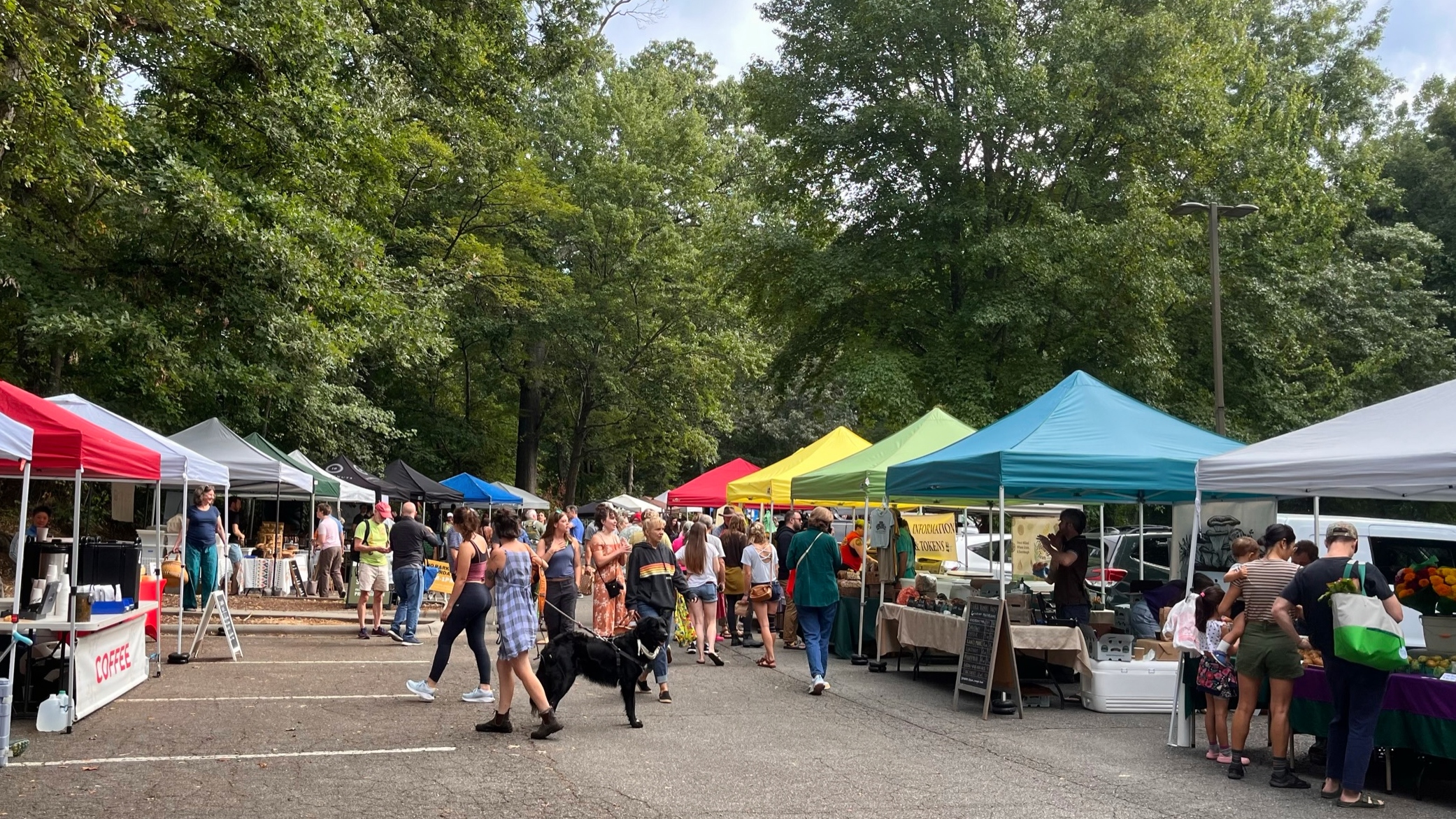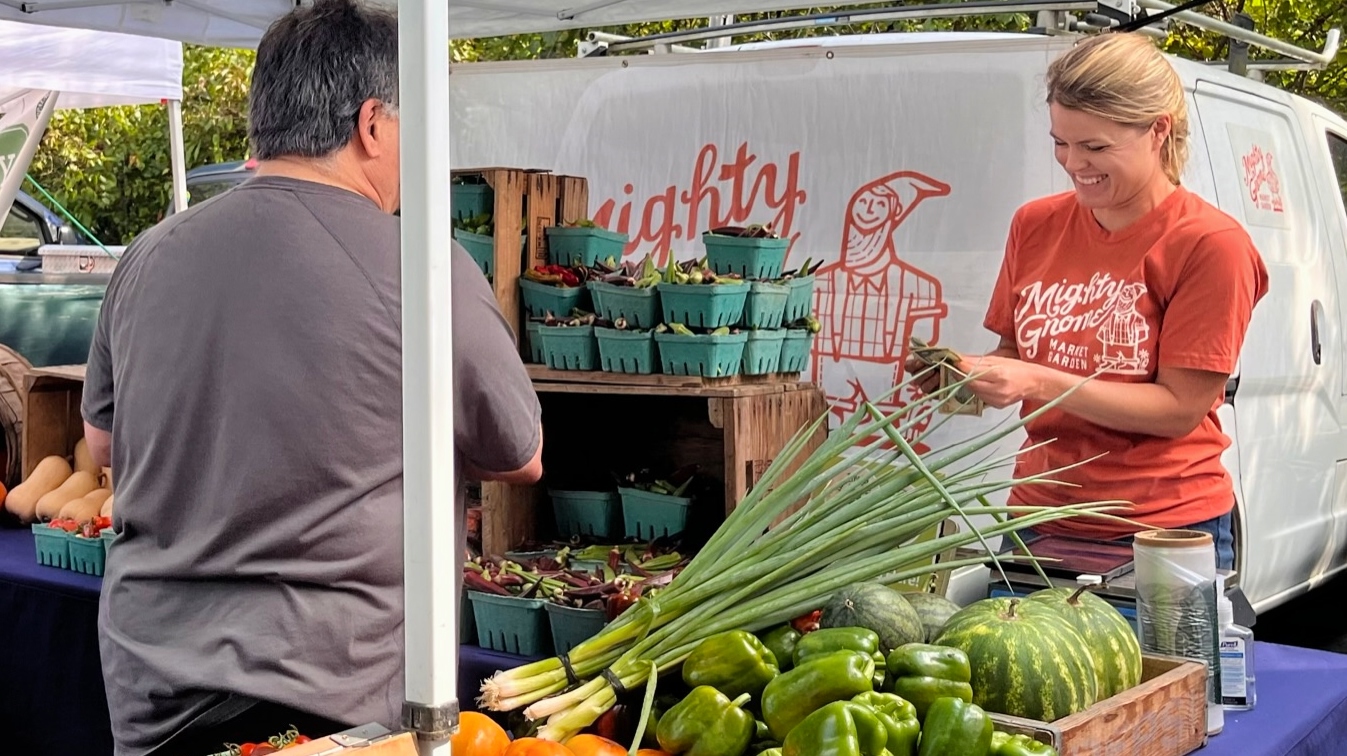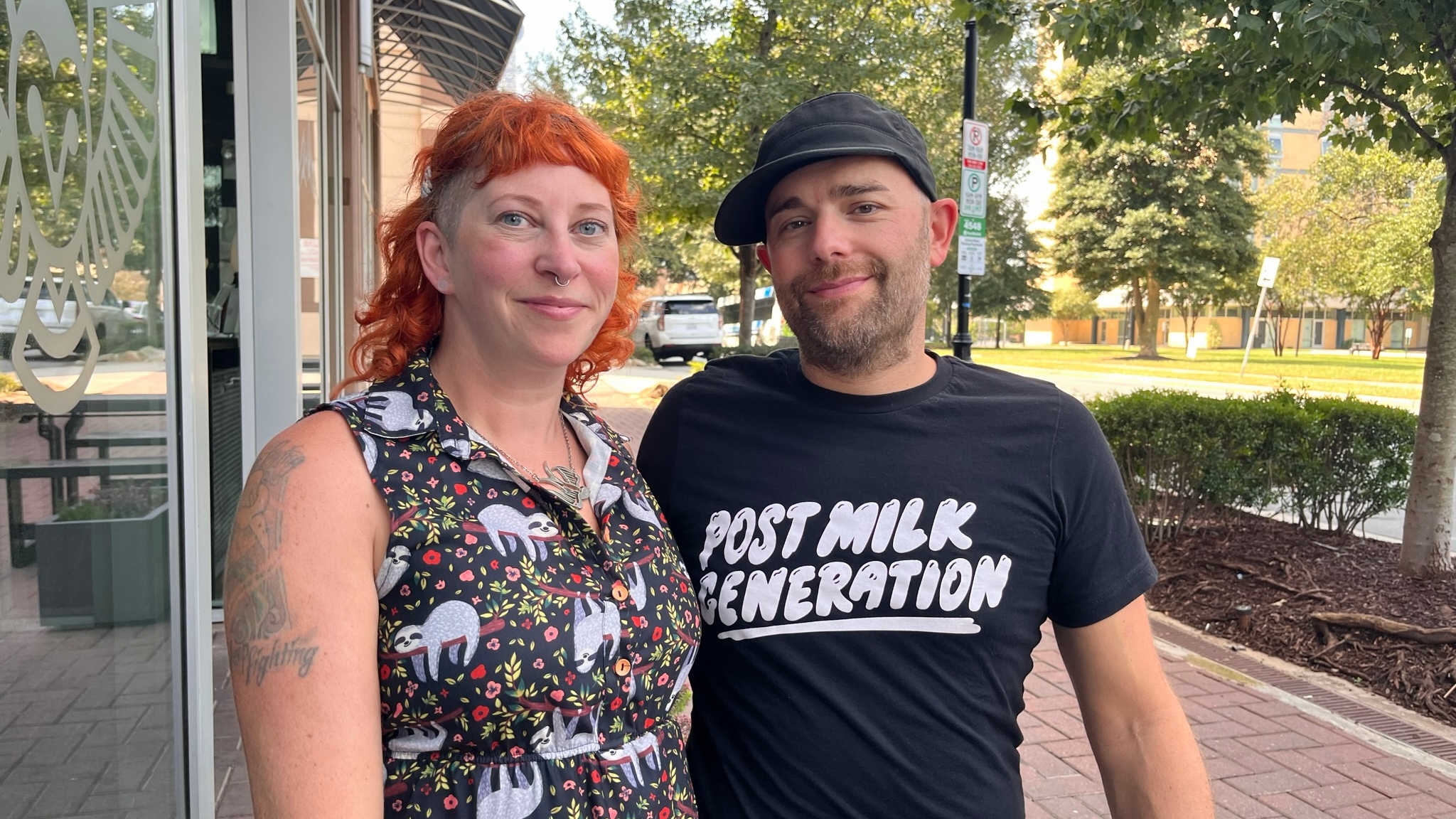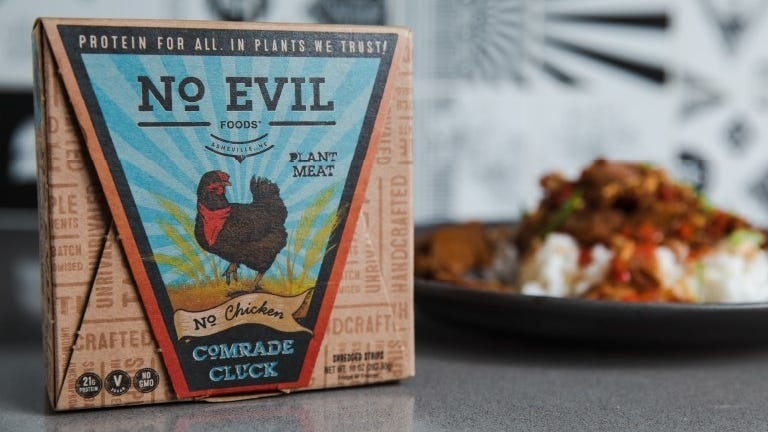|
Getting your Trinity Audio player ready...
|
This article first appeared in The Food Section, which we have partnered with to look at the stories behind what we eat.
There are always new restaurants in Asheville to talk about. A recent update from the city’s tourism office highlighted a dozen openings, including a live-fire kitchen serving shellfish beignets, a brewery with two miniature golf courses, and a fried-fish spot where the sandwiches are served on Frisbees.
Yet those aren��t the places that locals are keen to discuss, at least if my recent conversations with strangers there are a reliable gauge. A man drinking a Negroni at Contrada’s snug bar, upon learning I’m a food writer, was the first one to ask me: “Whatever happened to No Evil?”
What happened at No Evil in 2020 was huge local news, since nobody anticipated a beloved vegan protein producer would clash with its workers so forcefully that the National Labor Relations Board would step in.
Eaters who had supported the brand since 2014, when its only retail outlet was a stand at the North Asheville Tailgate Market, were equally shocked to learn of its sudden demise in 2021. After years of runaway growth, culminating in Whole Foods, Publix, and Walmart stocking No Evil’s animal-free interpretations of carnivorous icons such as Italian sausage and pulled pork, No Evil shut down its Buncombe County production facility without warning. Almost overnight, No Evil meatless meat disappeared, and seemingly, so did the couple behind it.
Customers were left feeling bitter and angry. Over time, though, their resentment gave way to curiosity. Where did Mike Woliansky and Sadrah Schadel go? Were they sorry? Would they make their chorizo from wheat gluten again?
Those were the questions I set out to answer. But first I had to understand just what a phenomenon No Evil was when it morphed from a farmers market darling into a brand that attracted the attention of venture capitalists eager to profit from what looked to be the nation’s next big food obsession.

Grocery store domination wasn’t a goal when Schadel and Woliansky first started experimenting with vegan recipes. Professionally, the two were amblers, following their passions for DIY culture and humanitarian work across the country. Accordingly, once they wound up staying with Schadel’s parents in rural upstate New York, the married couple went on a self-sufficiency kick.
Almost immediately, they figured out their at-home meals would be more interesting if the produce they harvested didn’t always have to present as vegetables. Because of their deep concern for animal welfare, they weren’t about to raise and slaughter livestock. For them, veganism was a moral choice—one they shared with many locavores in Asheville, where they relocated in 2014 to launch the No Evil Foods line.
Even though they didn’t develop their meat alternatives with scaling in mind, early customers persuaded the couple that they could coax more omnivores to try animal-free eating with their riffs on chickpeas and soy. So, in 2017, Schadel and her father jerry-rigged a booth for Natural Products Expo East.
For producers of quirky, provocative, or challenging foods, trade shows loom large. When the calendar is a carousel of squabbles with copackers, sales meetings with skeptical grocery buyers, and lost battles with aging equipment, the days spent offering bite-sized samples and sound bites stand out, regardless of what the grind yields.
At this event, nearly 1,500 established companies and startups showed off flavored ghee in travel packets, fishless lox cream cheese, powdered hearts of palm, and Sriracha hemp seeds. But none of those appeared on the big screen when an Expo exec delivered her keynote “state of the industry” address.
“The hottest trend of 2017, and one I am so excited about, is one we call the plant revolution,” Carlotta Mast said, pausing on a slide of No Evil Foods’ pulled pork-esque product. “No Evil Foods, they do vacuum-packed meat alternatives in this amazing, very millennial friendly packaging. It’s really delicious … you would totally want this product.”
Want was an understatement. Buyers stormed No Evil’s wobbly booth after the presentation.
Suddenly, Schadel, a former social services worker, and Woliansky, who’d gigged with arena rocker Billy Squier, were thrust into the role of cutting-edge food heavyweights. The two of them still made their sausage simulacrum and other products in a shared-use facility on the Asheville-Buncombe Technical Community College campus in Asheville.
Within a year, No Evil had grown its retail outlet list from 200 stores in the Southeast to 1,200 stores across the country and was hiring workers to help keep up with demand. By late spring of 2019, when Schadel showcased No Evil at the first Plant Based World Expo in New York City, No Evil was sold at 5,000 stores nationwide.
At the inaugural vegan trade show, held months before anyone had ever heard the word “COVID,” producers were giddy for the future. That May, Beyond Meat’s stock price nearly tripled on the day of its IPO. In August, Burger King started selling Impossible Whoppers at 7,000 locations.
High on their own hype, and without the business experience to recognize the contours of a bubble, producers like Schabel and Woliansky trusted that the universe had blessed their visions of doing well by doing good. They were going to make fortunes—cumulative billions, industry forecasts suggested—while stemming climate change, reducing obesity, and saving animals.
Around the same time, Danielle Keeter came across an ad for a production job at No Evil Foods, which had just moved into a leased 16,000-square-foot production facility in Weaverville, north of Asheville. To staff its factory, No Evil needed dozens of new workers.
“I was very curious about food production at that scale, and how they made that food, because I liked the product,” said Keeter, who’d been a vegetarian for years but became a vegan convert after trying it and feeling healthier.
Keeter joined the No Evil night crew that September, clocking in each day around 3 p.m. to mix, spice, and compress the company’s signature products, and then clean machinery before going home.
She was so fond of her co-workers and the free vegan snack station that she persuaded her partner to apply there, too. Over time, though, she began to suspect that the business wasn’t run like other places where she’d worked—and not in a good way. For one thing, a pair of colleagues had been fired, they claimed, without warning.

At that point in 2019, No Evil hadn’t formalized its disciplinary procedures, instead relying on open-door policies and a family-like atmosphere to mitigate any problems.
“That was the biggest red flag,” Keeter said of the dismissals that she felt were mishandled, particularly in a workplace hamstrung by chronic short staffing. “Having had so many jobs, I’d just not seen anything like that.”
Jon Reynolds, a longtime vegan, was so impressed by No Evil’s mission that he gave up his sales position at a senior living facility in Jacksonville for an hourly wage job on the production floor. Yet he too noticed practices that seemed unorthodox. He was surprised that workers wore ski goggles for eye protection, and worried about plunging his hands into cleaning solution so corrosive that it burned holes in his gloves.
In 2019, just a few weeks after Reynolds was hired, a worker handed him a union authorization card, the first step down the long road toward a collective bargaining agreement. Since he felt like the company wasn’t paying adequate attention to equipment maintenance, he signed on to unionize with the United Food and Commercial Workers Union.
When Keeter learned about the union drive, she was intrigued too. Her research suggested that a union could protect her unsuspecting co-workers from being fired on a whim. “Even if you’ve done something wrong, you still deserve a warning,” she reasoned.
Most workers, though—even those who wanted a union, like Reynolds and Keeter—liked their jobs. They say they just wanted a contract to lock in aspects of the work they appreciated, and to deter practices they didn’t, such as scheduling changes necessitated by product demand at No Evil. Although the greater societal trends weren’t apparent at the time, it turned out the company was situated somewhere between the twilight of startup culture and the dawn of labor rights’ resurgence—and all parties involved were about to pay a price for operating in the dark.
“That was the biggest red flag. Having had so many jobs, I’d just not seen anything like that.”
Danielle Keeter, former No Evil employee
What became of the workers’ aspirations has since been hashed out in exhaustive detail on podcasts and via social media, so when I first messaged Schadel and Woliansky—who relocated to Charlotte in 2022 so their kids could be closer to Schadel’s parents and brother—I assured them that I was more interested in exploring the company’s relationship to its past than excavating each element of it.
Still, I wanted to understand how the organizing drive unfolded from their point of view, which they say was clouded by inexperience and exhaustion, and further impeded by a loss in Woliansky’s family that coincided with the company’s relocation.
Woliansky told me he was sitting at a picnic table outside the factory on an autumn day when a union organizer approached him and asked if he worked for the company.
“I just didn’t know what to do,” Woliansky said. “I mean, six months beforehand, I was in the kitchen with these people making the product. I didn’t feel like we were separated: Those people could come and talk to me. I felt like I was very receptive.”
Jittery and confused, Woliansky and Schadel asked board members for guidance. They were unanimous in their advice: Shut the unionizing efforts down. Shut it down before word reaches prospective investors.
They told the founders, “This is going to be very detrimental to your ability to exist.”
Woliansky and Schadel asked for an attorney referral, and ended up retaining Constangy, Brooks, Smith, and Prophete, a firm that advertises its expertise in “union avoidance campaigns.”
The Constangy firm traces its roots back to 1940s Georgia, where Frank Constangy helped textile factories clamp down on union drives by advising their owners to fire organizers and refuse to hire their relatives. Before long, No Evil management had posted “Vote No” signs at the production plant and required attendance at “informational” meetings, including one—covertly recorded and posted online—at which Woliansky pledged to provide better coffee, upgrade an employee perks program, and offer mental health benefits if employees rejected the union. At later sessions, according to former employees, managers stressed vegans would be cozying up with meatpackers if they joined the United Food and Commercial Workers Union and warned that unions protect sexual harassers.
“When you’re getting pressure from your board and investors to make certain decisions, you feel powerless,” Schadel said. “We did not act in accordance with our morals and values, and that is something I will always regret, but I also didn’t feel a lot of choice.”

The anti-union campaign was successful. In February 2020, a majority of employees voted not to unionize.
Keeter was so disenchanted by the results that she quit. But the vote didn’t put the matter to rest. In the stressful pandemic months that followed, the relationship between owners and workers continued to deteriorate, with disagreements over hazard pay and dress codes intensifying. Reynolds stayed on but was fired three months later for an alleged social distancing violation.
No Evil’s devoted customers were taken aback by anonymous social media accounts dedicated to accusing the company of union busting. Posts on @soevilfoods and @moevilfoods alternated between screenshots of corporate memos and surreptitious recordings, and commentary on the material. “Vegans should be against all forms of oppression,” one post read. “If your veganism ends where the needs of your investors begin, you are not an ally to the oppressed, you are an oppressor.”
In May 2020, Reynolds and another employee filed a complaint with the National Labor Relations Board on the grounds of surveillance, retaliation, and discharge. The NLRB ruled in September 2020 that No Evil illegally terminated them because they tried to form a union. The company settled with the pair for $42,500.
Regardless of the out-of-court settlement cost, or the attorney fees they paid in the months leading up to the union vote, Woliansky and Schadel say the organizing drive wasn’t a major factor in their decision to shut down the Weaverville facility in June 2021.
Leading up to the closure, No Evil’s owners were struggling to keep the business afloat, as each new retail account they’d brought on board weighed down the indebted company further. According to Schadel, they were “very eager, earnest, and altruistic entrepreneurs,” inclined to say yes to every potential growth opportunity, regardless of the financial risk associated with it. In its seven-year history, the company never once turned a profit.
Complicating No Evil’s quest for solvency were the unanticipated costs of COVID-related supply chain shifts, as well as the changing fortunes of alternative proteins. Fake meat’s popularity plunged in the early 2020s, with research firm Datassential reporting in 2023 that one out of every two American consumers is either “not open” to plant-based meat or quit buying it after trying it once.
When Schadel and Woliansky closed the plant, they were planning to shift money spent on operations and wages to a copacker, or contract manufacturer, so they could fulfill their standing orders.
As it turned out, they couldn’t afford even that.
In a teary meeting on June 11, 2021, they dismissed No Evil’s production workers. The 50 employees were offered boilerplate letters of recommendation, but not a penny in severance, a move which outraged brand loyalists. “What a despicable company,” one Asheville resident wrote on Facebook after Asheville’s Citizen-Times quoted from an audio recording of the meeting, also shared by the Mo Evil Foods protest account. “They are truly profits over people.”
Woliansky describes the sudden plant closure as an “inevitable financial collapse,” hastened by an anticipated investment not materializing.
“We were about to run out of money,” he said. “We couldn’t pay everybody; we couldn’t keep the place open; we couldn’t pay the lease; we couldn’t do anything. We were burning $500,000 a month, and it was just not sustainable.”
For consumers beyond western North Carolina, that’s when No Evil vanished. The company turned off commenting on its Instagram feed in the wake of the production facility shutdown, but when the function was restored in September, followers’ questions were usually the same:
“We miss the chicken. Is it still on the market?”
“Are you no longer at Whole Foods?”
“I can’t find your product in Sprouts anymore. Is there a reason?”
Over the next year, as they fought off creditors in court and redesigned their packaging, Woliansky and Schadel treated their social media followers to glamor shots of vegan dishes and cute pet pictures. Then, on November 16, 2022, the couple began crowdfunding an online store. They were going back to direct-to-consumer sales, same as they did in their early farmers market days, selling plant-based meat made by a copacker via web orders and subscriptions.
“We did not act in accordance with our morals and values, and that is something I will always regret, but I also didn’t feel a lot of choice.”
Sadrah Schadel, No Evil cofounder
Roughly a year later, on November 2, 2023, they announced on Instagram that their online store was fully stocked and ready to ship nationwide. Today, several Whole Foods Markets in the Southeast are carrying the line again, although availability is sporadic, so fans swap tips about where and when to find their favorites.
“We’re growing in a staircase model,” Schadel said. “Let’s say you launch into 50 new retailers. Once you roll that out, you pause and make sure you’re profitable. It’s not really about size: It’s about existing.”
Considering they had to essentially start a new company from scratch—or at least puzzle out production, funding, and distribution in a world that’s no longer infatuated with alternative meat—while fighting off persistent bad publicity, I asked Schadel why they stuck with the No Evil name. Why not just market their non-beef strips under another moniker, perhaps one which wouldn’t invite mockery?
“I would just say we worked hard as hell to build the brand until it fell apart,” she said. “We weren’t ready to just walk away from that. We still believe in our mission, and we refuse to give up.”
Since No Evil is now scarce on retail shelves, Keeter doesn’t have the chance to buy the pseudo-chorizo that charmed her before she was a No Evil employee. But she suspects she wouldn’t purchase it if she could.
“It’s one thing to say, ‘We’re sorry this happened’,” Keeter said. “It’s another thing to say, ‘We actively tried to stop [the union] and that was wrong.’ That acknowledgment, to me, would be a significant thing.”
As Keeter and other former employees see it, accountability is a core tenet of veganism. She believes it should extend to “how you treat human beings.”

Reynolds, who admits he’s “still salty” about No Evil, said of the owners’ commitment to veganism, “I never caught them eating a steak. They were true to that. It just didn’t carry over to the people who worked for them.”
For their part, Schadel and Woliansky want to focus on what they consider the aesthetics and ethics of veganism. They’re thinking about how to “close the gap between good ingredients and good taste,” relaxing self-imposed restrictions on using oils that might not comply with cardiac patients’ prescribed diets. They’re trying to regain the financial footing to support animal rescue. (Margo, a rescue dog with Doberman pinscher and shepherd genes, accompanied Schadel and Woliansky to our meeting.)
“People hold us to a very high standard,” Schadel said of the hurt that former workers still feel, and the backlash that almost every social media post and press mention provokes from vegans who feel the brand betrayed vegan principles. “They haven’t given us space to move forward, saying, ‘OK, I get it. They’re human. They’re just humans running a business. They make mistakes like everyone else.’”
After all, she said, all they ever promised was they’d try their best.
“The name was Do Good Foods, but we thought that sounded super lame, so we made it No Evil, which is about doing as little harm as possible,” she said. “And that is kind of the definition of veganism. It’s not about being perfect. It’s about striving to do better.”
Hanna Raskin is editor and publisher of The Food Section, a newsletter covering food and drink across the South. You can reach her at hanna@theassemblync.com.


